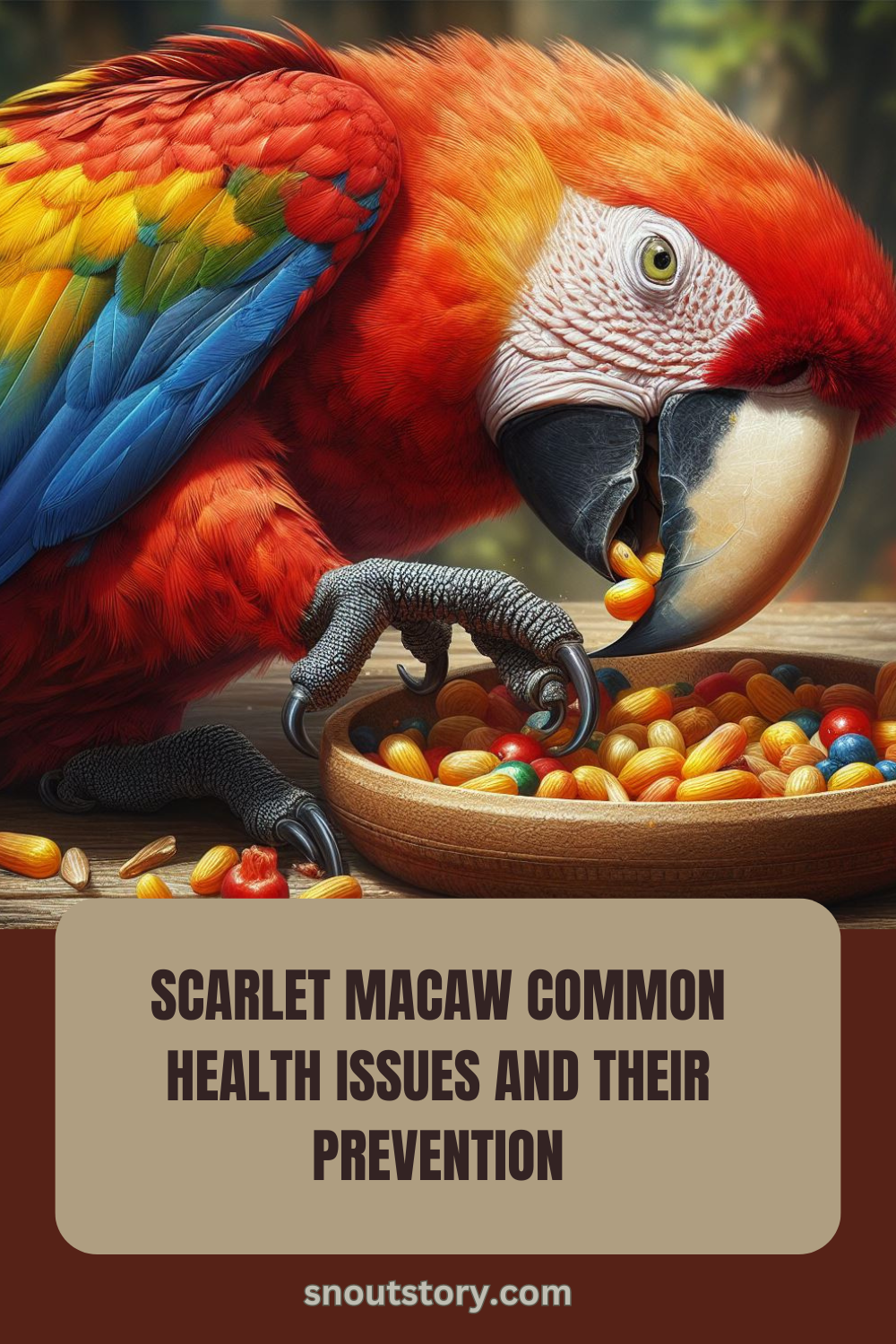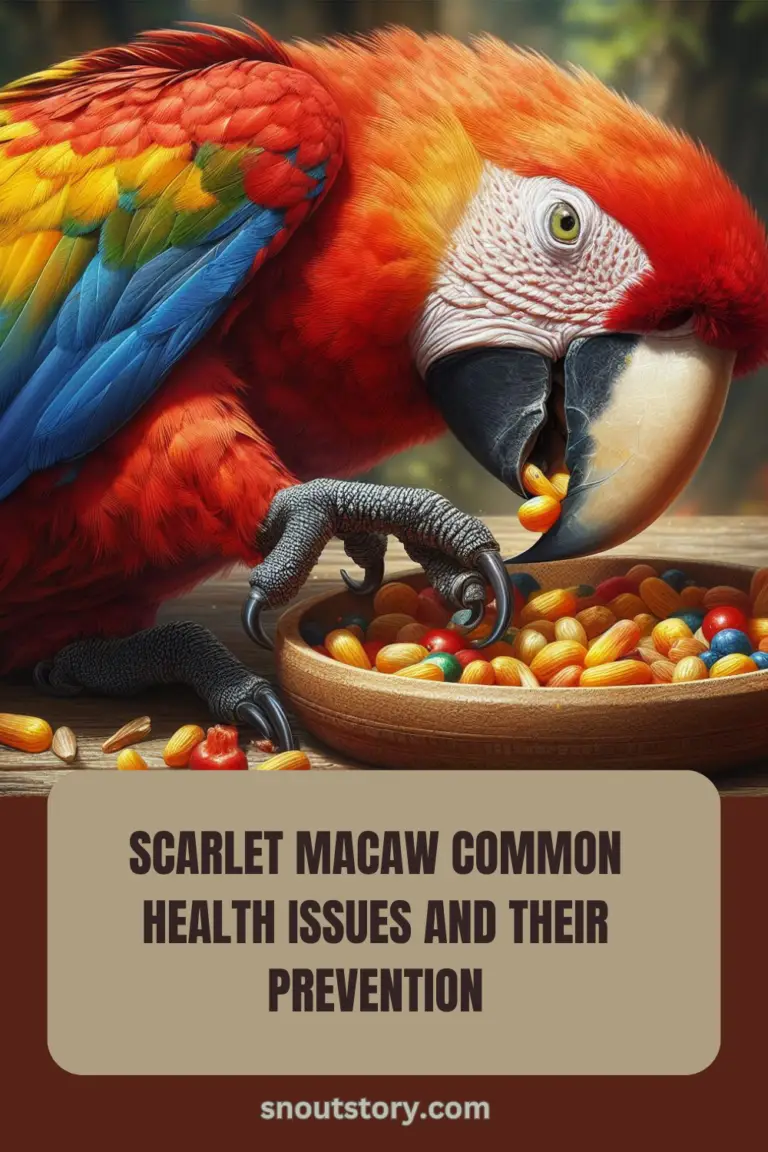Welcome to our comprehensive guide on the health, lifespan, and care of Scarlet Macaws! Scarlet Macaws, known for their vibrant plumage and charming personalities, are beloved companions for many bird enthusiasts.
In this guide, we delve into the essential aspects of maintaining the well-being of these magnificent birds. From understanding their unique health concerns to extending their lifespan through proper care practices, we cover everything you need to know to ensure your Scarlet Macaw lives a long, happy, and healthy life by your side.
Whether you’re a seasoned Scarlet Macaw owner or considering adding one to your family, this guide will provide valuable insights to help you become a knowledgeable and responsible caretaker for these captivating avian companions.
Common Health Issues in Scarlet Macaws
Scarlet Macaws, like all pets, can experience various health issues that require attention and care. Understanding these common health issues can help pet owners recognize symptoms early and take appropriate action. Here are some key health concerns for Scarlet Macaws:
- Feather Plucking: Feather plucking is a behavior in which birds excessively groom or pull out their feathers, often due to stress, boredom, or health problems. Providing mental and physical stimulation, such as toys and social interaction, can help alleviate this issue.
- Respiratory Infections: Scarlet Macaws are susceptible to respiratory infections, which can be caused by poor ventilation, drafts, or exposure to pollutants. Maintaining a clean living environment and regular veterinary check-ups are essential for preventing and managing respiratory issues.
- Nutritional Deficiencies: Inadequate nutrition can lead to vitamin and mineral deficiencies in Scarlet Macaws. A balanced diet comprising pellets, fresh fruits, and vegetables is crucial for their overall health. Supplementation with avian-specific vitamins may be necessary under veterinary guidance.
- Psittacosis: Also known as parrot fever, psittacosis is a bacterial infection that can affect Scarlet Macaws. Practicing good hygiene when handling birds and seeking immediate veterinary care for any signs of illness are essential precautions.
- Beak and Nail Overgrowth: Captive Scarlet Macaws may experience beak and nail overgrowth due to the lack of natural wear. Providing appropriate perches and regular veterinary beak and nail trims can prevent discomfort and injuries.
- Obesity: Overfeeding and a diet high in fatty foods can lead to obesity in Scarlet Macaws. Monitoring food intake, providing opportunities for exercise, and offering healthy treats are important for maintaining a healthy weight.
- Giardiasis: Giardiasis is a parasitic infection that can cause gastrointestinal issues in Scarlet Macaws. Ensuring clean living conditions and providing fresh water daily can help prevent this infection.
- Heavy Metal Toxicity: Exposure to heavy metals like lead and zinc can be toxic to Scarlet Macaws. Using bird-safe materials for their cages and accessories and keeping their environment free from lead-based paints are crucial preventive measures. If ingestion is suspected, immediate veterinary assistance is necessary.
Nutrition and Diet for Scarlet Macaws
When it comes to the nutrition and diet of Scarlet Macaws, providing a well-balanced and varied diet is essential for their health and well-being. These vibrant birds thrive on a diverse menu that includes high-quality pellets, fresh fruits, and vegetables.
Incorporating a mix of colorful fruits like apples, bananas, and berries, along with nutrient-rich vegetables such as carrots, broccoli, and leafy greens, ensures they receive essential vitamins, minerals, and antioxidants. Additionally, offering occasional treats like nuts or seeds can provide mental stimulation and enrichment.
However, it’s crucial to avoid feeding them avocados, chocolate, caffeine, and high-fat or salty foods, which can be harmful to their health. Regularly monitoring their diet, providing fresh water daily, and consulting with a veterinarian for personalized dietary recommendations are key steps in maintaining optimal nutrition for Scarlet Macaws.
Here’s A Detailed Guide About Scarlet Macaw Diet (Click Here to Read)
Lifespan Expectancy of Scarlet Macaws
Scarlet Macaws are known for their impressive lifespan, which can range from 40 to 50 years or even more in captivity with proper care (Around 75-90 years in captivity with proper care). This remarkable longevity underscores the importance of providing a nurturing environment and meeting their physical, mental, and emotional needs throughout their lives.
Factors such as a balanced diet, regular exercise, mental stimulation, veterinary care, and a stress-free living environment contribute significantly to their overall well-being and lifespan. Additionally, fostering a strong bond with their human caregivers through positive interactions, socialization, and enrichment activities can enhance their quality of life and promote longevity.
By prioritizing their health and happiness and addressing any potential health issues promptly, Scarlet Macaw owners can help ensure that these magnificent birds enjoy a fulfilling and extended lifespan as cherished companions.
Preventive Care Practices for Scarlet Macaws Health
To maintain the optimal health and well-being of Scarlet Macaws, proactive preventive care practices are essential. Regular veterinary check-ups play a crucial role in detecting any potential health issues early on, allowing for timely intervention and treatment.
Additionally, providing a balanced and nutritious diet tailored to their specific dietary needs, along with access to fresh water at all times, is vital for supporting their overall health. Proper hygiene and cleanliness in their living environment, including regularly cleaning their cage or aviary, perches, and toys, help prevent the spread of pathogens and reduce the risk of infections.
Implementing enrichment activities to stimulate their physical and mental faculties, such as foraging toys, puzzles, and interactive play sessions, can promote their overall well-being and prevent boredom-related behaviors. Lastly, monitoring their behavior and physical condition closely for any changes or signs of illness allows for prompt intervention and ensures that any health issues are addressed promptly, helping to maintain their vitality and longevity.
Environmental Considerations for Scarlet Macaw Health
Ensuring optimal environmental conditions is crucial for maintaining the health and well-being of Scarlet Macaws. Providing a spacious and well-ventilated living space with ample room for flight and movement is essential to prevent stress and promote physical activity.
It’s important to regulate temperature and humidity levels within their habitat to mimic their natural tropical environment, as extreme temperatures or fluctuations can negatively impact their health. Additionally, minimizing exposure to potential hazards such as drafts, toxic fumes, and direct sunlight is essential to prevent respiratory issues, poisoning, and overheating.

Creating a stimulating and enriching environment with natural perches, branches, and toys encourages physical exercise, mental stimulation, and prevents boredom-related behaviors. Regularly cleaning and disinfecting their living space helps prevent the spread of pathogens and reduces the risk of infections. Lastly, providing access to clean, chlorine-free water for drinking and bathing is vital for their hydration and plumage health. By paying close attention to these environmental considerations, Scarlet Macaw owners can create a safe and supportive habitat that promotes their overall health and well-being.
Here’s A Detailed Guide About Ideal Scarlet Macaw Enclosure (Click Here to Read)
Mental and Emotional Well-being of Scarlet Macaws
Ensuring the mental and emotional well-being of Scarlet Macaws is essential for their overall health and happiness. These intelligent and social birds thrive in environments that provide opportunities for mental stimulation, social interaction, and emotional fulfillment. Engaging them in various enrichment activities such as puzzle toys, foraging opportunities, and training sessions not only keeps their minds active but also strengthens the bond between them and their owners.
Additionally, spending quality time with these birds through positive interactions, such as gentle handling, talking, and playing, helps build trust and confidence, reducing the risk of behavioral issues like aggression or feather plucking. Providing a safe and secure environment where they feel comfortable expressing their natural behaviors, such as flying, exploring, and vocalizing, is crucial for their emotional well-being.
Furthermore, establishing a consistent routine with regular feeding, grooming, and socialization helps create a sense of security and stability, contributing to their overall mental and emotional health. By prioritizing their mental and emotional needs, Scarlet Macaw owners can ensure that their feathered companions lead fulfilling and enriched lives.
Veterinary Care for Scarlet Macaws
Proper veterinary care is crucial for maintaining the health and well-being of Scarlet Macaws. These majestic birds, like any other pet, require regular check-ups and monitoring to ensure they are in optimal condition.
Avian veterinarians specialize in the unique needs of birds and can provide invaluable guidance on diet, housing, and overall care. During veterinary visits, thorough examinations are conducted to detect any signs of illness or underlying health issues. Vaccinations, parasite prevention, and routine grooming procedures such as beak and nail trims are also part of the comprehensive care plan.
Additionally, avian veterinarians can offer advice on behavioral concerns and provide support for any specific health challenges that Scarlet Macaw owners may encounter. Building a strong relationship with a trusted avian veterinarian is essential for addressing any health concerns promptly and ensuring the longevity and happiness of these magnificent birds.
Maintaining Optimal Hygiene for Scarlet Macaws

Maintaining optimal hygiene for Scarlet Macaws is paramount to their overall health and well-being. These vibrant birds are susceptible to various health issues if their environment is not kept clean and sanitary. Regular cleaning of the cage or aviary, including removing droppings, uneaten food, and soiled bedding, helps prevent the buildup of bacteria and parasites. Providing fresh, clean water daily is essential to ensure proper hydration and prevent the growth of harmful pathogens. Additionally, regular bathing or misting sessions can help Scarlet Macaws maintain healthy feathers and skin. Owners should also pay attention to their bird’s grooming habits, ensuring that their beak, nails, and feathers are in good condition. Incorporating natural cleaning methods, such as using mild, bird-safe cleaners or vinegar solutions, can help maintain hygiene without exposing the birds to harsh chemicals. By prioritizing cleanliness and hygiene in their care routine, Scarlet Macaw owners can help promote their pet’s health and longevity.
Summary
In summary, caring for Scarlet Macaws involves a combination of attentive nutrition, proper housing, regular veterinary care, and hygiene maintenance. By understanding the unique needs and characteristics of these magnificent birds, owners can provide them with the best possible care to ensure their health and well-being.
From establishing a balanced diet rich in nutrients to creating a stimulating environment that promotes mental and physical health, each aspect of care contributes to the overall quality of life for Scarlet Macaws. Furthermore, staying informed about common health issues, preventive measures, and veterinary resources empowers owners to address any concerns promptly and effectively.
With dedication and proper care, Scarlet Macaw companionship can be immensely rewarding, fostering strong bonds and enriching the lives of both birds and their human caregivers.
Recommended
Scarlet Macaw : Health, Lifespan and Care (Everything New Owner Must Know)
8 Easy Training Techniques for Your Scarlet Macaw (Build An Unbreakable Bond)
Scarlet Macaw : Creating An Ideal Cage Setup (Everything A New Owner Should Know)
Scarlet Macaw : Food and Diet (Everything New Owners Should Know)
Everything About the Vibrant Scarlet Macaw

Vedant Narvekar is an experienced digital marketing expert with a profound love for nature and animals. With a career rooted in leveraging online platforms to drive engagement and promote meaningful causes, Vedant’s passion for animals inspired him to start Snout Story—a blog dedicated to educating people about pet keeping and sharing proper knowledge about caring for animals. Drawing on his expertise in digital marketing, Vedant utilizes his platform to advocate for responsible pet ownership, providing valuable insights on pet care, training, nutrition, and more. Through Snout Story, Vedant aims to empower pet lovers with the information they need to provide the best possible care for their furry companions, while also fostering a deeper appreciation for the natural world and the creatures that inhabit it.






